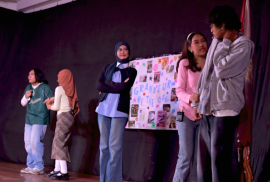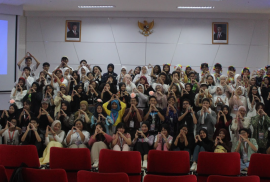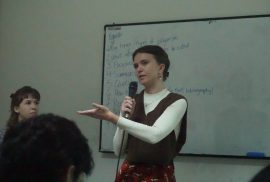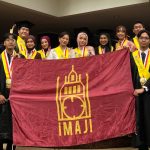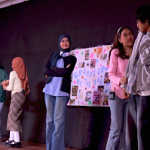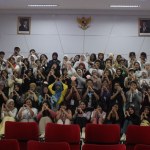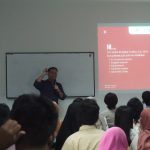Arsip:
SDG 17 – Partnerships for the Goals
Students from the English Literature Study Program at the Faculty of Cultural Sciences, Universitas Gadjah Mada (FIB UGM), organised the yearly English Days 2025 event. The stage play “Deserved It,” an English-language drama with secrets […].
Sasynchronize is an exhilarating event assembled by the batch 2023 of the English Literature Study Program with the aim of strengthening the connection with the batch of 2024.
The English Literature Study Program at Universitas Gadjah Mada (UGM)’s Faculty of Cultural Sciences recently hosted a seminar on academic ethics and the integrity of scientific work.
The English Studies Program, Faculty of Cultural Sciences, Universitas Gadjah Mada, is pleased to announce the names of students who have been officially selected to join the prestigious RWS Internship Program – Batch 2025.
A youth-led, non-profit organisation, AIYA seeks to improve the connections between young Australians and Indonesians as well as the opportunities that exist between Australia and Indonesia through cultural and language exchanges, professional programs, and more.
Ayfa Hurin Ien, a student from English Studies Program, is currently participating in a Lithuanian Language and Culture Winter Course. This is a month-long program designed for international students to learn Lithuanian at various level […].
From November 20–22, 2024, Florinesya Zahwa Raihania, a student from the English Department, participated in the prestigious ASEAN Youth Conference (AYC). Since its inception in 2018, the AYC has served as a flagship program of […].
We are opening a 10-meeting mentoring program exclusively for English Department students interested in enrolling in the IISMA student exchange. For those who are interested, please enroll via bit.ly/MentoringIISMAED2024 before 11 September..
As American universities increasingly prioritize Science, Technology, Engineering, and Mathematics (STEM) fields, humanities and language programs, especially those focusing on less commonly taught languages, face a significant funding decline.
SGDs 4: Quality Education | SGDs 4: Literacy skill | SGDs 17: Global partnership | SGDs 17: Partnerships for the Goals On Wednesday, 18 July 2024, english Department UGM received a visit from Prof. Angus […].

